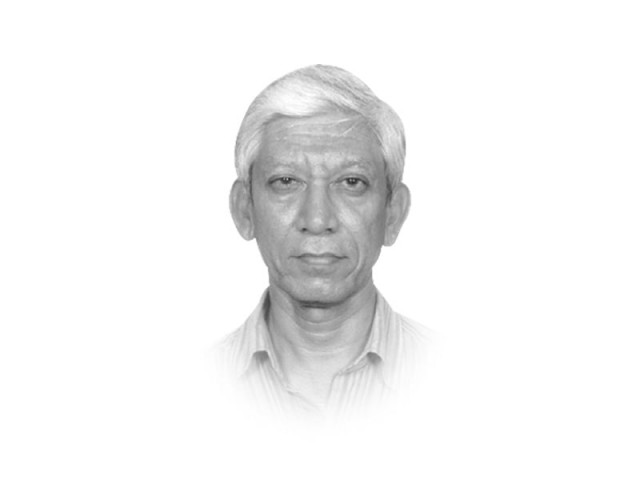Personal accounts of 1971
We were carefully indoctrinated through Jasarat into supporting Jamaat in 1970 elections.

Personal accounts of 1971
However, these are the hazards if you wish to go through recorded memories of individuals with a curiosity to know what really happened, and what it means to us today as individuals and collectively — in whichever way we choose to align ourselves with others around us. While reading such individual memoirs one must do a lot of discounting, which is a process inevitably coloured by one’s own preferred narrative. As I intend to discuss a few such accounts in this space in the coming few weeks, let me first say what I remember.
I was a class nine student then, in a private school in Hyderabad, Sindh, which was located in a satellite town, called Latifabad, demographically dominated by us refugees from Rajasthan, UP and East Punjab, with the new, post-Partition migrants from the northern parts of West Pakistan. The school was run by a group of motivated individuals who actively sympathised with the Jamaat-e-Islami. Most members of the group were Ashraaf of Rajasthan. Although big and small towns of Sindh, including Hyderabad, had become home to a large number of Rajasthanis (and Kathiawaris and other Gujaratis as well), but since they typically belonged to non-Ashraaf castes, they were under the heavy cultural domination of the UP-Punjab elites who supported the officially defined ‘Pakistan Ideology’. This dominant politics did not have much space in it for the political aspirations of the linguistic majority of the newly restored province — i.e. the Sindhis — let alone the culturally suppressed Rajasthanis and Gujaratis, who were the ethnic vote bank of the Jamaat and different avatars of the Muslim League in those days and were destined to be taken over by the MQM, when the said politics threw away the ideological garb and came out in its true, ethnic colour.
Those managing our school, which had a reputation of being run by the Jamaat until it was nationalised under the Bhutto government’s education policy, fully reflected this politics. As school kids, we were encouraged to read the Jamaat literature and books by Iqbal and Nasim Hijazi that filled the school library and to fill in the ‘haami’ (supporter) form to attain the lowest rung of membership of the Islami Jamiat-e-Talaba, the well-known students’ wing of the Jamaat. Beginning from class six, the entry grade at the school, we were carefully indoctrinated into supporting the Jamaat in the 1970 elections, the party which most of our parents voted for, and reading Jasarat, the organ of the Jamaat, which made a big deal out of the pomp and show demonstrated in the so-called ‘Shaukat-e-Islam’ rallies; this gave a lot of space to the ideological pronouncements of General Sher Ali Khan, the influential minister of information and broadcasting in General Yahya Khan’s martial law cabinet and predicted the sweeping victory of the Jamaat as an almost fait accompli. The Jamiat-e-Talaba literature assured us an imminent chance to turn Pakistan into another Indonesia and a graveyard of socialists (‘soshaliston ka qabrustan’). We knew little about the massacre of leftists in Indonesia at the hands of the army and its ideological disciples then, but nevertheless felt suitably excited at the nearing prospect of turning the (unseen) enemies into heaps of dead bodies (‘kushton ke pushte’).
The results of the damned 1970 elections dashed our hopes, as everyone knows very well, though not exactly quenched our thirst for the blood of those who fell in the vaguely defined category of ‘traitors’ (‘ghaddar’). We were quite liberal in categorising people as ghaddars (we still are, aren’t we!); for us anyone challenging the cultural and political hegemony of the rulers (with a particular ethnic and religious profile) was fit to be thrown into the pit. Those filling the pages of Jasarat routinely condemned many political groups as such: the Awami League, the People’s Party, the National Awami Party, the Sindh Muttahida Mahaz and other such parties (not to mention those who had the cheek to call themselves ‘socialists’ or ‘communists’ — how could anyone say such horrible things about himself, we used to wonder).
I remember the evening when I and other students from my school were attending a workshop organised by the Jamaat for the Jamiat-e-Talaba members in the courtyard of the Jamia Arabia, just at the foot of the Tilak Charrhi (facing on the opposite side of the street were St. Bonaventure Boys School and St. Mary’s Girls School). An announcement was made that our president and chief martial law administrator, General Agha Mohammad Yahya Khan, was about to address the nation on an important matter and that the proceedings would be suspended so that the participants could listen to the president’s speech. The public address system was made to relay the martial voice and we heard that he had ordered the army action against the traitors that we had been demanding for long. As soon as the speech ended, a resolution was passed in which the great ruler was congratulated on taking this brave step and saving Pakistan’s integrity from traitors who had been challenging the state writ ever since they had won a majority in the constituent assembly. Later, we were to be told that it was the villainous Bhutto, alone, who had blasphemously declared that the army action had saved Pakistan!
Published in The Express Tribune, December 3rd, 2011.














COMMENTS
Comments are moderated and generally will be posted if they are on-topic and not abusive.
For more information, please see our Comments FAQ